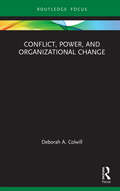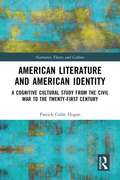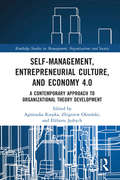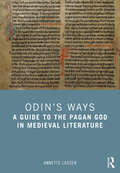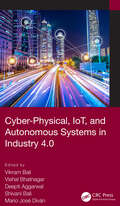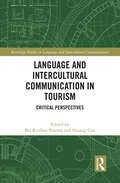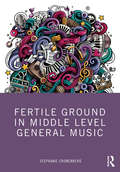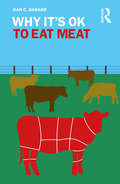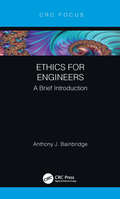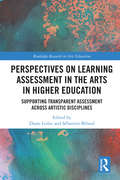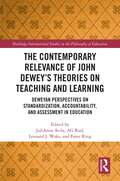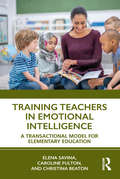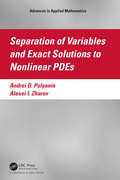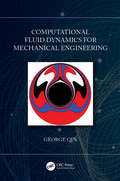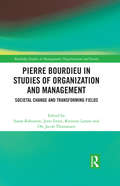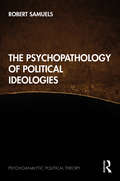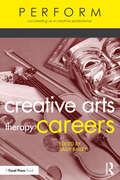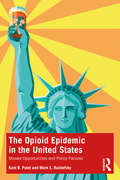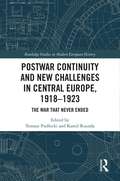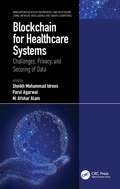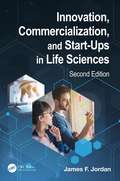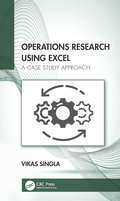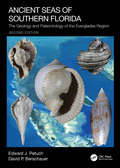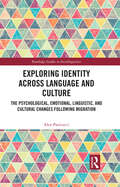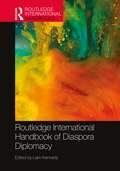- Table View
- List View
Conflict, Power, and Organizational Change (ISSN)
by Deborah A. ColwillA capacity for learning, adapting, and changing is an important facet of organizational resilience. What is involved in generative organizational change? Is it an event, a process, or constantly ongoing? What makes organizational change "good" for the organization? Who has the power to decide what is "good" for the organization and its members? How is it decided? What if there is strong disagreement or conflict? How is that handled? What is the role of organizational members and leaders in these discussions? As these questions demonstrate, the triad of change, power and conflict are intimately linked. The purpose of this book is to explore the topics of change, power and conflict as they relate to the experiences of everyday organizational life. It will provide readers the opportunity to reflect critically on their own local experience and involvement in organizations and to glean actionable wisdom for meaningful engagement and impactful contributions to their organization(s) in the present and future.Conflict, Power, and Organizational Change will be of interest to students, researchers, academics and professional colleagues interested in the fields of business and organizational studies, especially those wanting to get acquainted with the concepts of change, power and conflict in contemporary organizational settings.
American Literature and American Identity: A Cognitive Cultural Study from the Civil War to the Twenty-First Century (Narrative Theory and Culture)
by Patrick Colm HoganIn recent years, cognitive and affective science have become increasingly important for interpretation and explanation in the social sciences and humanities. However, little of this work has addressed American literature, and virtually none has treated national identity formation in influential works since the Civil War. In this book, Hogan develops his earlier cognitive and affective analyses of national identity, further exploring the ways in which such identity is integrated with cross-culturally recurring patterns in story structure. Hogan examines how authors imagined American identity—understood as universal, democratic egalitarianism—in the face of the nation’s clear and often brutal inequalities of race, sex, and sexuality, exploring the complex and often ambivalent treatment of American identity in works by Charlotte Perkins Gilman, Eugene O’Neill, Lillian Hellman, Djuna Barnes, Amiri Baraka, Margaret Atwood, N. Scott Momaday, Spike Lee, Leslie Marmon Silko, Tony Kushner, and Heidi Schreck.
Self-Management, Entrepreneurial Culture, and Economy 4.0: A Contemporary Approach to Organizational Theory Development (Routledge Studies in Management, Organizations and Society)
by Agnieszka RzepkaThis book offers practical insight into the changing ways in which organizations operate today. Building on a groundbreaking concept of teal organizations, the book illustrates the practicality of advocating a lack of hierarchy of predetermined positions and the introduction of roles that come with clear responsibilities constantly defined according to current needs. First described by Frederic Laloux, a teal organization is a ground-breaking approach to managing organizations that is being adopted around the world, which turns everyone into a leader. This new paradigm rests on the ideas of wholeness, evolutionary purpose, employee autonomy, and self-management based on peer relationships. Its main assumption is the empowerment of the employee resulting in a change in workplace relationships and a more soulful and purposeful work environment.Drawing on the authors’ research across six different countries, it presents the evolution of self-management and entrepreneurial culture in the current age of Economy 4.0 and examines how the teal concept has been implemented around the world. It examines misconceptions surrounding this novel approach and diagnoses the practical problems connected with implementing it in the current uncertain times. It will be of value to researchers, academics, managers, and students in the fields of management and organizational studies.
Odin’s Ways: A Guide to the Pagan God in Medieval Literature
by Annette LassenThis book is about the Old Norse god Odin. It includes references to all occurrences of Odin in the Old Norse/Icelandic texts, including Saxo’s Gesta Danorum, the eddic poems, Snorri’s Edda, and Ynglinga saga and analyses the high medieval reception and literary representations of Odin rather than the religious character of the god. This is the only existing study of Odin in all the Old Norse/Icelandic texts and applies a contextual method: the different guises of Odin are studied on the basis of the various textual contexts and on their background in the literary and Christian intellectual milieu of the time. Contrary to existing studies, this method is non-reductive in that it does not aim at providing a synthesis about Odin’s original nature on the basis of the differing textual uses of Odin in the Middle Ages. The book argues that the perceived complexity of Odin, often highlighted in research, is first and foremost a function of the complex textual material spanning a wide variety of genres each with its particular literary conventions and of the reception of Odin in early modern and modern mythological studies.
Cyber-Physical, IoT, and Autonomous Systems in Industry 4.0
by Vikram Bali Vishal Bhatnagar Deepti Aggarwal Shivani Bali Mario José DivánThis book addresses topics related to the Internet of Things (IoT), machine learning, cyber-physical systems, cloud computing, and autonomous vehicles in Industry 4.0. It investigates challenges across multiple sectors and industries and considers Industry 4.0 for operations research and supply chain management.Cyber-Physical, IoT, and Autonomous Systems in Industry 4.0 encourages readers to develop novel theories and enrich their knowledge to foster sustainability. It examines the recent research trends and the future of cyber-physical systems, IoT, and autonomous systems as they relate to Industry 4.0. This book is intended for undergraduates, postgraduates, academics, researchers, and industry individuals to explore new ideas, techniques, and tools related to Industry 4.0.
Language and Intercultural Communication in Tourism: Critical Perspectives (Routledge Studies in Language and Intercultural Communication)
by Bal Krishna SharmaThis collection critically examines tourism as a site of intercultural communication, drawing on the analytical tools afforded by the discipline toward better understanding contemporary tourism discourses and the broader societal structures of power and ideologies in which they are situated.The volume interrogates culture and interculturality in tourism in detailed analyses of discursive details in tourism interactions and focuses on the notion of culture as a process or phenomenon engaged in or enacted on by individuals. Drawing on discourse analytic and ethnographic approaches, the book brings together perspectives from the lived experiences of residents, hosts and ethnographers to explore the extent to which linguistic and cultural differences are constructed, identities negotiated, and power relations maintained and perpetuated in tourism encounters. The volume draws on insights from those working across a range of geographic contexts and explores the interplay of these issues in English as well as other languages and language varieties used in tourism interactions.With its focus on critical approaches to understanding language and culture, this book will appeal to students and scholars in intercultural communication, applied linguistics, sociolinguistics, linguistic anthropology, discourse analysis, and tourism studies.
Fertile Ground in Middle Level General Music
by Stephanie CronenbergFertile Ground in Middle Level General Music guides music educators to inspire their middle level students (grades 5–8) to engage more deeply in the general music classroom, where students are given the opportunity to "try on" a range of roles: musician, composer, listener, and critic. The book outlines the Fertile Ground Framework, a teacher's aide for curricular decision-making that unites the middle level concept with the National Core Arts Standards while emphasizing the developmental needs and cultural identities of students. This resource-rich book provides teachers with an array of adaptable classroom support tools, including: Lesson sequences Activity ideas Teacher resources and worksheets "Do-Now" exercises Featuring the real-world perspectives of thirteen music educators, Fertile Ground in Middle Level General Music is both practical and theoretical, presenting methods for creating rich, inspiring learning environments in middle level general music classrooms of all shapes and sizes, and highlighting the unacknowledged strengths that already exist therein. Focused on the aim of motivating students to pursue lifelong music learning, this book helps instructors find joy and excitement in teaching a wide array of musical topics to diverse groups of middle level music students.
Why It's OK to Eat Meat (Why It's OK)
by Dan C. ShaharVegetarians have argued at great length that meat-eating is wrong. Even so, the vast majority of people continue to eat meat, and even most vegetarians eventually give up on their diets. Does this prove these people must be morally corrupt? In Why It’s OK to Eat Meat, Dan C. Shahar argues the answer is no: it’s entirely possible to be an ethical person while continuing to eat meat—and not just the "fancy" offerings from the farmers' market but also the regular meat we find at most supermarkets and restaurants. Shahar’s examination forcefully echoes vegetarians’ concerns about the meat industry’s impacts on animals, workers, the environment, and public health. However, he shows that the most influential ethical arguments for avoiding meat on the basis of these considerations are ultimately unpersuasive. Instead of insisting we all become vegetarians, Shahar argues each of us has broad latitude to choose which of the world’s problems to tackle, in what ways, and to what extents, and hence people can decline to take up this particular form of activism without doing anything wrong.Key Features First book-length defense of meat-eating written for a popular audience Punchy, accessible introduction to the multifaceted debate over the ethics of eating meat Includes pioneering new examinations of humane labeling practices Shows why appeals to universalized patterns of behavior can’t vindicate vegetarians’ claims that there’s a duty to avoid meat Develops a novel theory of ethical activism with potential applications to a wide range of other issues
Ethics for Engineers: A Brief Introduction
by Anthony F. BainbridgeThis book is a key introduction to ethics in engineering, providing professionals at all stages of their career with guidance on navigating the increasingly complex world of practising engineering ethically on an international scale.Engineering professionals face a duty to uphold reliable and trustworthy behaviour when working across all disciplines and industries. Accuracy and rigour are essential parts of the modern workplace, and are increasingly of concern to practising engineers. Using case studies to highlight examples of issues within the workplace and how these can be appropriately handled, this book is an accessible tool through which engineers can gain confidence in dealing with ethical dilemmas in the workplace. Touching upon safety, risk, artificial intelligence, autonomous systems, and intellectual property, alongside sustainability and environmental matters, the book focuses on hot topics which are fast becoming day-to-day issues dealt with by engineers.The book will be suitable for engineers of all disciplines, alongside students looking to become professional chartered engineers.
Perspectives on Learning Assessment in the Arts in Higher Education: Supporting Transparent Assessment across Artistic Disciplines (Routledge Research in Arts Education)
by Diane Leduc Sébastien BélandDrawing on theoretical and empirical insights from art teachers in Canada and Europe, this edited volume explores the question of how learning in the arts can be effectively and fairly assessed in the context of higher education.The chapters consider a rich variety of assessment practices across music, visual and plastic arts, performing arts, design, fashion, dance and music and illustrate how knowledge, competencies, skills and progress can be viably and fairly assessed. Contextual challenges to assessment are also considered in depth, and particular attention is paid to the challenges of reconciling teaching in the arts, aimed at an intuitive transformation of the student, and assessing learning that takes on its meaning in subjectivity and sensitivity.This text will benefit researchers, academics and educators in higher education with an interest in assessment in the artistic disciplines and in the topic of creativity more broadly. Those specifically interested in educational assessment policy and the visual arts will also benefit from this book.
The Contemporary Relevance of John Dewey’s Theories on Teaching and Learning: Deweyan Perspectives on Standardization, Accountability, and Assessment in Education (Routledge International Studies in the Philosophy of Education)
by JuliAnna ÁvilaThrough expert analysis, this text proves that John Dewey’s views on efficiency in education are as relevant as ever. By exploring Deweyan theories of teaching and learning, the volume illustrates how they can aid educators in navigating the theoretical and practical implications of accountability, standardization, and assessment. The Contemporary Relevance of John Dewey’s Theories on Teaching and Learning deconstructs issues regarding accountability mechanisms, uniform assessment systems, and standardization processes through a Deweyan lens. Connecting the zeitgeist of the era from which Dewey’s ideas emerged and current global political, social, and economic contexts, the book emphasizes the importance of resilient systems in reconciliating the tension between standardized assessments and individual student development. Contributors provide insights from a range of settings across Pre-K, primary, secondary, and higher education and address topics including teacher agency, voice, leadership, and democracy.The volume will be of interest to scholars, researchers, and academics with an interest in philosophy of education, education policy and the impact of neoliberal agendas, as well as teaching and learning more broadly.
Training Teachers in Emotional Intelligence: A Transactional Model For Elementary Education
by Elena Savina Caroline Fulton Christina BeatonTraining Teachers in Emotional Intelligence provides pre- and in-service teachers with foundational knowledge and skills regarding their own and their students’ emotions. Teachers are increasingly charged with providing social-emotional learning, responding to emotional situations in the classroom, and managing their own stress, all of which have real consequences for their retention and student achievement. Focused on the primary/elementary level, this book is an accessible review of children’s emotional development, the role of emotions in learning, teaching, and teachers’ professional identity. The book provides strategies for teachers to foster their emotional awareness, use emotions to promote learning and relationships, foster emotional competencies in students, and stay emotionally healthy.
Separation of Variables and Exact Solutions to Nonlinear PDEs (ISSN)
by Andrei D. Polyanin Alexei I. ZhurovSeparation of Variables and Exact Solutions to Nonlinear PDEs is devoted to describing and applying methods of generalized and functional separation of variables used to find exact solutions of nonlinear partial differential equations (PDEs). It also presents the direct method of symmetry reductions and its more general version. In addition, the authors describe the differential constraint method, which generalizes many other exact methods.The presentation involves numerous examples of utilizing the methods to find exact solutions to specific nonlinear equations of mathematical physics. The equations of heat and mass transfer, wave theory, hydrodynamics, nonlinear optics, combustion theory, chemical technology, biology, and other disciplines are studied.Particular attention is paid to nonlinear equations of a reasonably general form that depend on one or several arbitrary functions. Such equations are the most difficult to analyze. Their exact solutions are of significant practical interest, as they are suitable to assess the accuracy of various approximate analytical and numerical methods.The book contains new material previously unpublished in monographs. It is intended for a broad audience of scientists, engineers, instructors, and students specializing in applied and computational mathematics, theoretical physics, mechanics, control theory, chemical engineering science, and other disciplines. Individual sections of the book and examples are suitable for lecture courses on partial differential equations, equations of mathematical physics, and methods of mathematical physics, for delivering special courses and for practical training.
Computational Fluid Dynamics for Mechanical Engineering
by George QinThis textbook presents the basic methods, numerical schemes, and algorithms of computational fluid dynamics (CFD). Readers will learn to compose MATLAB® programs to solve realistic fluid flow problems.Newer research results on the stability and boundedness of various numerical schemes are incorporated. The book emphasizes large eddy simulation (LES) in the chapter on turbulent flow simulation besides the two-equation models. Volume of fraction (VOF) and level-set methods are the focus of the chapter on two-phase flows.The textbook was written for a first course in computational fluid dynamics (CFD) taken by undergraduate students in a Mechanical Engineering major.Access the Support Materials: https://www.routledge.com/9780367687298.
Pierre Bourdieu in Studies of Organization and Management: Societal Change and Transforming Fields (Routledge Studies in Management, Organizations and Society)
by Sarah RobinsonThere is increasing academic interest in how Pierre Bourdieu’s sociology can be applied to management and organization studies (MOS). In a context of increasing complexity faced by organizations and those who work in them due to globalization, neoliberalism, austerity, financial crisis, ecological issues, populism and developing technologies, there is untapped potential to use Bourdieu’s theoretical inventions to arrive at greater understandings of how change, transition and crisis shape work, organizational life as well as relations between different organizational and sectorial fields.This book aims to take a specific focus on the relational nature of Bourdieu’s work and its relevance for contemporary organizations. It provides empirically-grounded examples that showcase the explanatory strength of Bourdieu´s intellectual concepts, such as field, habitus, capital, hexis, hysteresis, symbolic power, symbolic violence, doxa, illusio as applied to the current challenges within MOS. Such challenges include issues resulting from globalization, neoliberalism, financial crisis, ecological crisis, populism and developing technologies, to name but a few; and added to those, a global pandemic. The twelve chapters presented in this book study a great variety and range of organizational phenomena that are organized into three thematic sections: ‘Neoliberalism, fields and hysteresis’, ‘Global and national movements as sites for competition and symbolic domination’ and the ‘The emergence and transformation of professional fields’. The chapters show a concern with the challenges and opportunities such developments offer to MOS scholars and to managers and employees in public and private sector organizations.It will be of interest to researchers, academics and students in the fields of organizational studies, critical management studies, human resource management and sociology.
The Psychopathology of Political Ideologies (Psychoanalytic Political Theory)
by Robert SamuelsInspired by Freud’s The Psychopathology of Everyday Life, this book examines the unconscious processes shaping contemporary political ideologies.Addressing ten fundamental questions, Robert Samuels identifies four basic political ideologies: liberal, conservative, Left, and Right, which are often placed in the structure of a logical square, determined by two binary oppositions, with a fifth structure of centrism complicating the square. He turns to psychoanalysis to explain the unconscious defense mechanisms that structure these political ideologies. Each chapter uses a recent, influential title as a gateway to the analysis of the ideologies and structures identified. Through this analysis, Samuels argues that belief in ideological structures is tied to triumvirates of institutions and ideals; conservatives being tied to premodern institutions of religion, feudalism, and monarchy, while modern liberals are tied to ideals of universality, objectivity, and empiricism. He concludes that this investment in universality shapes the ethics of modern globalization and democratic liberalism. Unlike other books, conclusions are reinforced through examples drawn from current events with an integrated model of different psychopathologies.The Psychopathology of Political Ideologies moves beyond providing an understanding of what drives different political investments, to offer a more rational and conscious comprehension of subjectivity and social organization. This book will be a great resource for those interested in politics, political science psychology, social psychology, globalization, and ideology.
Creative Arts Therapy Careers: Succeeding as a Creative Professional (ISSN)
by Sally BaileyCreative Arts Therapy Careers is a collection of essays written by and interviews with registered drama therapists, dance/movement therapists, music therapists, art therapists, poetry therapists, and expressive arts therapists.The book sheds light on the fascinating yet little-known field of the creative arts therapies – psychotherapy approaches which allow clients to use creativity and artistic expression to explore their lives, solve their problems, make meaning, and heal from their traumas. Featuring stories of educators in each of the six fields and at different stages of their career, it outlines the steps one needs to take in order to find training in one of the creative arts therapies and explores the healing aspects of the arts, where creative arts therapists work, who they work with, and how they use the arts in therapy. Contributors to this book provide a wealth of practical information, including ways to find opportunities to work with at-risk populations in order to gain experience with the arts as healing tools; choosing the right graduate school for further study; the difference between registration, certification, and licensure; and the differences between a career in a medical, mental health, educational, correctional, or service institution.This book illuminates creative arts therapy career possibilities for undergraduate and graduate students studying acting, directing, playwriting, creative writing, visual arts, theatre design, dance, and music. It is also an excellent resource for instructors offering a course to prepare arts students of all kinds for the professional world.
The Opioid Epidemic in the United States: Missed Opportunities and Policy Failures
by Kant B. Patel Mark E. RushefskyThe current opioid epidemic in the United States began in the mid-1990s with the introduction of a new drug, OxyContin, viewed as a safer and more effective opiate for chronic pain management. By 2017, the opioid epidemic had become a full-blown crisis as over two million Americans had become dependent on and abused prescription pain pills and street drugs.This book examines the origins, development, and rise of the opioid epidemic in the United States from the perspective of the public policy process. The authors, political scientists Kant Patel and Mark Rushefsky, discuss institutional features of the American political system that impact the making of public policy, arguing that the fragmentation of that system hinders the ability to coherently address policy problems, taking the opioid epidemic as an example. The book begins with a brief historical examination of the history of the problem of opioid addiction and crises in the United States and public policy responses to past crises, but the main focus is on the current national public health emergency. The book analyzes the following: The origins of the current crisis Indicators and warning signs pointing to the emergence of a significant public problem Factors that contributed to the opioid crisis Why the crisis emerged in the United States and not in other Western countries The nature and scope of the opioid crisis, including socioeconomic and demographic characteristics and the human, social, and economic costs Presidential administrations’ public response, and nonresponse, to the opioid crisis Parallels between the role played by opioid manufacturers and tobacco/cigarette manufacturers in creating the problem of addiction, resulting in high mortality rates, and the public policy response to both This book explores the national policy response to the opioid crisis, as well as state and local government responses and separation of powers, including how the three branches of government deal with the opioid problem. The authors conclude with a discussion of how accurate problem definition, problem diagnosis, and appropriate and timely responses could have produced a more appropriate and robust policy response—policy process tools that will be essential in fighting both the current crisis and the next one. The Opioid Epidemic in the United States is essential reading for policy analysis courses in political science, health, and social work programs, as well as for United States policymakers at the local, state, and national levels.
Postwar Continuity and New Challenges in Central Europe, 1918–1923: The War That Never Ended (Routledge Studies in Modern European History #87)
by Tomasz Pudłocki Kamil RuszałaThis book presents a multi-layered analysis of the situation in Central Europe after the collapse of the Austro-Hungarian Empire. The new geopolitics emerging from the Versailles order, and at the same time ongoing fights for borders, considerable war damage, social and economic problems and replacement of administrative staff as well as leaders, all contributed to the fact that unlike Western Europe, Central Europe faced challenges and dilemmas on an unprecedented scale. The editors of this book have invited authors from over a dozen academic institutions to answer the question of to what extent the solutions applied in the Habsburg Monarchy were still practiced in the newly created nation states, and to what extent these new political organisms went their own ways. It offers a closer look at Central Europe with its multiple problems typical of that region after 1918 (organizing the post-imperial space, a new political discourse and attempts to create new national memories, the role of national minorities, solving social problems, and verbal and physical violence expressed in public space). Particular chapters concern post-1918 Central Europe on the local, state and international levels, providing a comprehensive view of this sub-region between 1918 and 1923.
Blockchain for Healthcare Systems: Challenges, Privacy, and Securing of Data (Innovations in Health Informatics and Healthcare)
by Sheikh Mohammad Idrees Parul Agarwal M. Afshar AlamBlockchain for Healthcare Systems: Challenges, Privacy, and Securing of Data provides a detailed insight on how to reap the benefits of blockchain technology in healthcare, as the healthcare sector faces several challenges associated with privacy and security issues. It also provides in-depth knowledge regarding blockchain in healthcare and the underlying components.This book explores securing healthcare data using blockchain technology. It discusses challenges and solutions for blockchain technology in the healthcare sector and presents the digital transformation of the healthcare sector using different technologies. It covers the handling of healthcare data/medical records and managing the medical supply chain all using blockchain technology.The contents of this book are highly beneficial to educators, researchers, and others working in a similar domain.
Innovation, Commercialization, and Start-Ups in Life Sciences
by James F. JordanInnovation is a translation of a new method, idea, or product into reality and profit. It is a process of connected steps that accumulates into a brand reputation required for success. Unlike Fortune 500 companies, whose projects are self-funded, a start-up must simultaneously have a value proposition that attracts a customer (for revenue), investors (for capital), and acquirers (for a liquidity event or IPO). A high percentage of start-ups fail before attaining positive cashflow, due to a variety of reasons that are detailed in this book.Avoiding the pitfalls and wrong turns are the goals of this book. Innovation, Commercialization, and Start-Ups in Life Sciences details the methodologies necessary to create a successful life science start-up from initiation to exit. Written by an expert who has worked with more nearly 500 life science start-ups, this book discusses specific processes and investor milestones that must be navigated to align customer, funder, and acquirer needs. Successful commercialization requires attention to multiple constituents, such as investors, regulators, and customers. Investors require liquidity for their return, which is achieved through selling their stock in a public or private sale. The reader will gain an appreciation for the necessary data, partnerships, and skills needed to create a competitive and sustainable company. The author discusses such specific issues as customer problems, demonstrating sales access, and ensuring intellectual property is impervious to competitive advancement. This book is intended to be suitable for entrepreneurs, venture capitalists, and investors in both business and academic settings. These organizations have specific departments, such as R&D, operations, business development, legal, regulatory, and marketing, that would also benefit from this book.FEATURES Focuses specifically on life science start-ups Examines how to determine a company valuation and future "fundable milestones" Explores how to align regulatory and clinical strategies Discusses intellectual property derived from a university or individual through formation to exit. Reviews how start‐ups must simultaneously meet the needs of multiple constituencies at once: investors, regulators, customers and exit candidates James F. Jordan is an author, consultant, and speaker. He is a Distinguished Service Professor of Healthcare & Biotechnology Management, a former Fortune 100 executive, and a managing director of a venture fund.Access the Support Material: https://healthcaredata.center/ Cover design by Sarah Mailhott.
Operations Research Using Excel: A Case Study Approach
by Vikas SinglaThe field of operations research provides a scientific approach to managerial decision making. In a contemporary, hypercompetitive ever-changing business world, a manager needs quantitative and factual ways of solving problems related to optimal allocation of resources, profit/loss, maximization/minimization etc. In this endeavor, the subject of doing research on how to manage and make operations efficient is termed as Operations Research. The reference text provides conceptual and analytical knowledge for various operations research techniques. Readers, especially students of this subject, are skeptic in dealing with the subject because of its emphasis on mathematics. However, this book has tried to remove such doubts by focusing on the application part of OR techniques with minimal usage of mathematics. The attempt was to make students comfortable with some complicated topics of the subject. It covers important concepts including sensitivity analysis, duality theory, transportation solution method, Hungarian algorithm, program evaluation and review technique and periodic review system. Aimed at senior undergraduate and graduate students in the fields of mechanical engineering, civil engineering, industrial engineering and production engineering, this book:• Discusses extensive use of Microsoft Excel spreadsheets and formulas in solving operations research problems• Provides case studies and unsolved exercises at the end of each chapter• Covers industrial applications of various operations research techniques in a comprehensive manner• Discusses creating spreadsheets and using different Excel formulas in an easy-to-understand manner• Covers problem-solving procedures for techniques including linear programming, transportation model and game theory
Ancient Seas of Southern Florida: The Geology and Paleontology of the Everglades Region
by Edward J. Petuch David P. BerschauerThe authors have done an outstanding job of compiling decades of data collected by their own field reconnaissance and other geoscientists… This represents a significant contribution to the understanding of the development of the Florida carbonate platform, and it will assist other disciplines as they strive for better understanding of our groundwater resources, aquifer characterizations, paleoenvironmental interpretations, and historical/educational geology programs.Walt Schmidt, Florida State Geologist & Chief, Florida Geological Survey, USA (praise for the first edition)Painting a complete picture of the history of the Everglades, Ancient Seas of Southern Florida: The Geology and Paleontology of the Everglades Region, Second Edition provides an overview of the geology, paleontology, and paleoceanography of the region. It emphasizes the upper 300m of the geologic framework of the area and gives insight into the local stratigraphy, geomorphology, lithology, and historical geology. Designed to be a field guide as well as a reference, the book is illustrated in full color with brand new photographs of exposed geologic sections, stratotype localities, collection sites, and details of interesting fossil beds.In this book, the authors illustrate almost 800 of the most important and diagnostic stratigraphic index fossils found in these beds, including over 50 species of corals and almost 700 species of mollusks, along with echinoderms, crustaceans, echinoids, petrified wood, and aquatic vertebrates. A new edition of The Geology of the Everglades and Adjacent Areas, it contains larger images of fossil shells, corals, and echinoderms and includes new updated geological data and concepts, as well as an expanded iconography of stratigraphic index fossils. Based on the data gleaned from these fossils, it also offers a series of geomorphological visualizations, showing the possible appearances of the Florida Peninsula during the times when it was covered by tropical seas, from the Oligocene to the late Pleistocene.This second edition provides a new perspective on both the historical geology of southern Florida and the evolution of one of America’s most beautiful natural treasures, the Everglades.
Exploring Identity Across Language and Culture: The Psychological, Emotional, Linguistic, and Cultural Changes Following Migration (Routledge Studies in Sociolinguistics)
by Alex PanicacciThis book explores the ways in which migrants’ experience in today’s multilingual and multicultural society informs language use and processing, behavioural patterns, and perceptions of self-identity.Drawing on survey data from hundreds of Italian migrants living in English- speaking countries, in conjunction with more focused interviews, this volume unpacks reciprocal influences between linguistic, cultural, and psychological variables to shed light on how migrants emotionally engage with the local and heritage dimensions across public and private spaces. Visualising the impact of a constant shifting of linguistic and cultural practices can enhance our understanding of migration experiences, foreign language acquisition, language processing and socialisation, inclusion, integration, social dynamics, acculturation tendencies, and cross-cultural communication patterns.Overall, this book appeals to students and scholars interested in gaining nuanced insights into the linguistic, cultural, and psychological underpinnings of migration experiences in such disciplines as sociolinguistics, cultural studies, and social psychology.
Routledge International Handbook of Diaspora Diplomacy (Routledge International Handbooks)
by Liam KennedyThe Routledge International Handbook of Diaspora Diplomacy is a multidisciplinary collection of writings by leading scholars and practitioners from around the world. It reflects on the geopolitical and technological shifts that have led to the global emergence of this form of diplomacy and provides detailed examples of how governments, intergovernmental organizations (IGOs), non-governmental organizations (NGOs) and corporations are engaging diasporas as transnational agents of intervention and change.The organization in six thematic parts provides for focused coverage of key issues, sectors and practices, while also building a comprehensive guide to the growing field. Each section features an introduction authored by the Editor, designed to provide useful contextual information and to highlight linkages between the chapters. Cross-disciplinary research and commentary is a key feature of the Handbook, providing diverse yet overlapping perspectives on diaspora diplomacy.• Part 1: Mapping Diaspora Diplomacy• Part 2: Diaspora Policies and Strategies• Part 3: Diaspora Networks and Economic Development• Part 4: Long-Distance Politics• Part 5: Digital Diasporas, Media and Soft Power• Part 6: Advancing Diaspora Diplomacy StudiesThe Routledge International Handbook of Diaspora Diplomacy is a key reference point for study and future scholarship in this nascent field.
